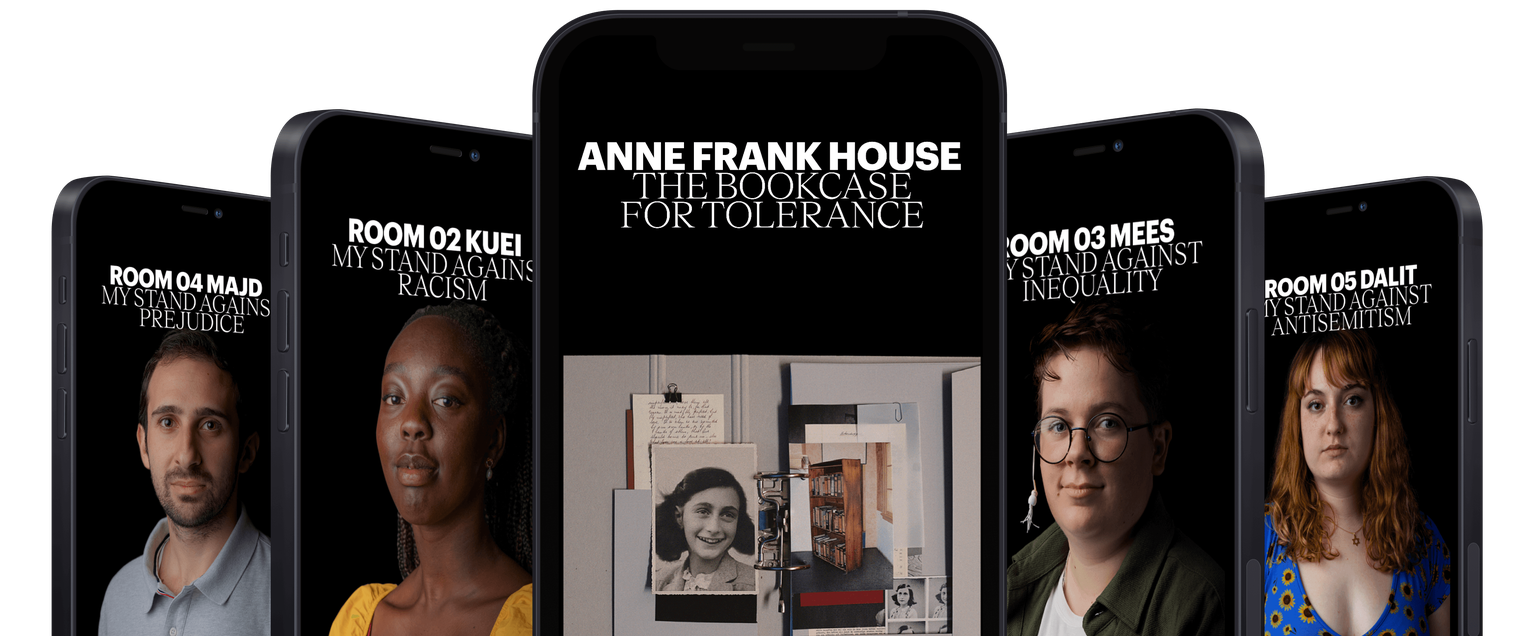Nov. 16, 2021
—
On this UNESCO International Day for Tolerance, the Anne Frank House launches The Bookcase for Tolerance. This app tells the stories of Anne Frank and of four young adults who are confronted with antisemitism, racism, and discrimination in Dutch society today.
In recent years, the number of reports of discrimination and antisemitic incidents has been on the rise. Under the slogan #DontHateEducate, the Anne Frank House aims to counter intolerance and discrimination through personal stories.
Augmented reality
In The Bookcase for Tolerance app, you can look around the rooms of Anne Frank and those of Dalit, Mees, Kuei and Majd in augmented reality. Dalit is frequently confronted with antisemitism. And as a trans person, Mees is not always accepted for who he is. Kuei is black woman, who is discriminated against for the colour of her skin. And as a refugee in the Netherlands, Majd often faces prejudice. In the app, they welcome you to their world and tell you about their lives, struggles, and their views of the future. Canadian actor Elliot Page, who as a transgender more often speaks out for more acceptance and tolerance, also contributed to this project. He recorded the voice-over of the teaser.
‘‘Let me be myself’, Anne Frank wrote in her diary on 11 April 1944. On that same day, she added: ‘One day this terrible war will be over. The time will come when we’ll be people again and not just Jews!’ The bookcase, which hides the entrance to the Secret Annex where Anne Frank spent over two years in hiding, reminds us of the damage that prejudice and discrimination can do. Many young people today are dealing with these same issues. The Bookcase for Tolerance tells their stories. We want to use the impact of their personal testimonies to challenge and counter intolerance and discrimination.’
Growing intolerance
The Anne Frank House aims to achieve global awareness of Anne’s life story and her work in an effort to encourage people to reflect on the dangers of antisemitism, racism, and discrimination and the importance of freedom, equal rights, and democracy. Even in 2021, this is still a big issue. Only last year, Dutch police logged twelve per cent more incidents of discrimination than in the previous year, according to the 2020 Discrimination in Numbers report.
Contemporary Stories in the Secret Annex
Dalit, Majd, Kuei and Mees first met in Anne Frank’s room, where they viewed each other’s recordings and Anne’s story. It was a special meeting where they exchanged experiences with intolerance and discussed the importance of acceptance in society. Kuei said: Acceptance is key. No matter how much you try to deny it, in the end, everyone wants to feel accepted and welcomed.” Mees added: “The best way to persuade people to accept you is to show them who you are. To show them: ‘this is me, and I am a good person. Just like you are.’”
The Bookcase for Tolerance
In the app, Anne Frank’s room can be seen in augmented reality for the first time. The stories and videos are all in English to make the app accessible to people worldwide. Starting today, The Bookcase for Tolerance is available for iOS (in the App Store) and Android (in the Google Play Store).
Partners
The app and campaign were conceived and created by Innocean Berlin, Media Monks, Massive Music, Hagens PR& Strategy, Johan Kramer, Ted Alkemade, Yvette de Wiyy, and Sven Shrader, who all volunteered their services. Many thanks to Dalit, Mees, Kuei, and Majd.
